Proposal to include computer programming in children’s academic test courts controversy
Source:Global Times Published: 2020/5/22 18:46:50

Pupils have computer class at the Jinzhai County primary school in Jinzhai, east China's Anhui Province, Sept. 3, 2019. (Xinhua/Zhang Duan)
Member of the Chinese People's Political Consultative Conference (CPPCC) and CEO of Chinese gaming giant NetEase, Ding Lei, proposed to include computer programming into the academic test of young children and make it an important criterion to evaluate children's comprehensive competence, sparking criticism online as netizens expressed concerns that it will be unfair for children from poverty-stricken families.
Ding's proposal calls for adding programming education into China's basic education system and cultivating digital talents.
The proposal led to fiery discussions online, with the hashtag "Ding Lei proposes to include computer programming into the academic test of children" garnering 200 million views, as of press time.
Some hailed the proposal by claiming programming can help cultivate logical thinking, and that computer skills are seen as an essential ability, as AI and big data technologies are becoming a new trend in the internet age.
A Weibo user commented if programming is included in the compulsory academic test, it will help narrow down the educational gap as many families in big cities have been encouraging their children to learn coding from a very young age, and it is costly to learn in private institutions.
Some; however, questioned the practicality of the proposal and cautioned that businessmen would draw advantage from this. "It is better to focus on relevant vocational education to cultivate more competent technical talents," one Sina Weibo user commented.
Many users also expressed their concerns as such practice will increase children's academic burden. It is not fair for children from poverty-stricken families with limited access to computers and internet, noted netizens.
"I think it is would be better to include it as an optional course so that children can choose based on their own interests," one Sina Weibo user commented.
Sophie Li, a resident in Suzhou, East China's Jiangsu Province, whose 10-year-old son recently won a national level programming contest, believes it would be better to introduce such a course for middle school or above students, instead of primary school students.
"My son loves programming. But there would be too much burden for kids if programming is added as academic tests," she told the Global Times.
"Programming makes children feel like the master of the internet world when they create something, as I observed. And it helps to motivate children to create and exercise their thinking," Ran Naiyan, a research fellow at the Beijing Academy of Educational Sciences, told Global Times Friday.
Ran noted that it is necessary to add a programming curriculum in China's basic education system as Ding proposed, which will help standardize programming teaching.
However, Ran noted it would be better to do so gradually, and decide whether to include it as an academic test, later, depending on future practice. "Otherwise, it would become a burden for students," Ran added.
Computer programming has gone viral across China as the country is encouraging schools to experiment with science, technology, engineering, and math (STEM) education, which includes coding. A 2018 report by iResearch predicts that the scale computer programming industry in China will reach 30 billion yuan ($4.21 billion) within 5 years.
Posted in: SOCIETY,小图DEPUTY